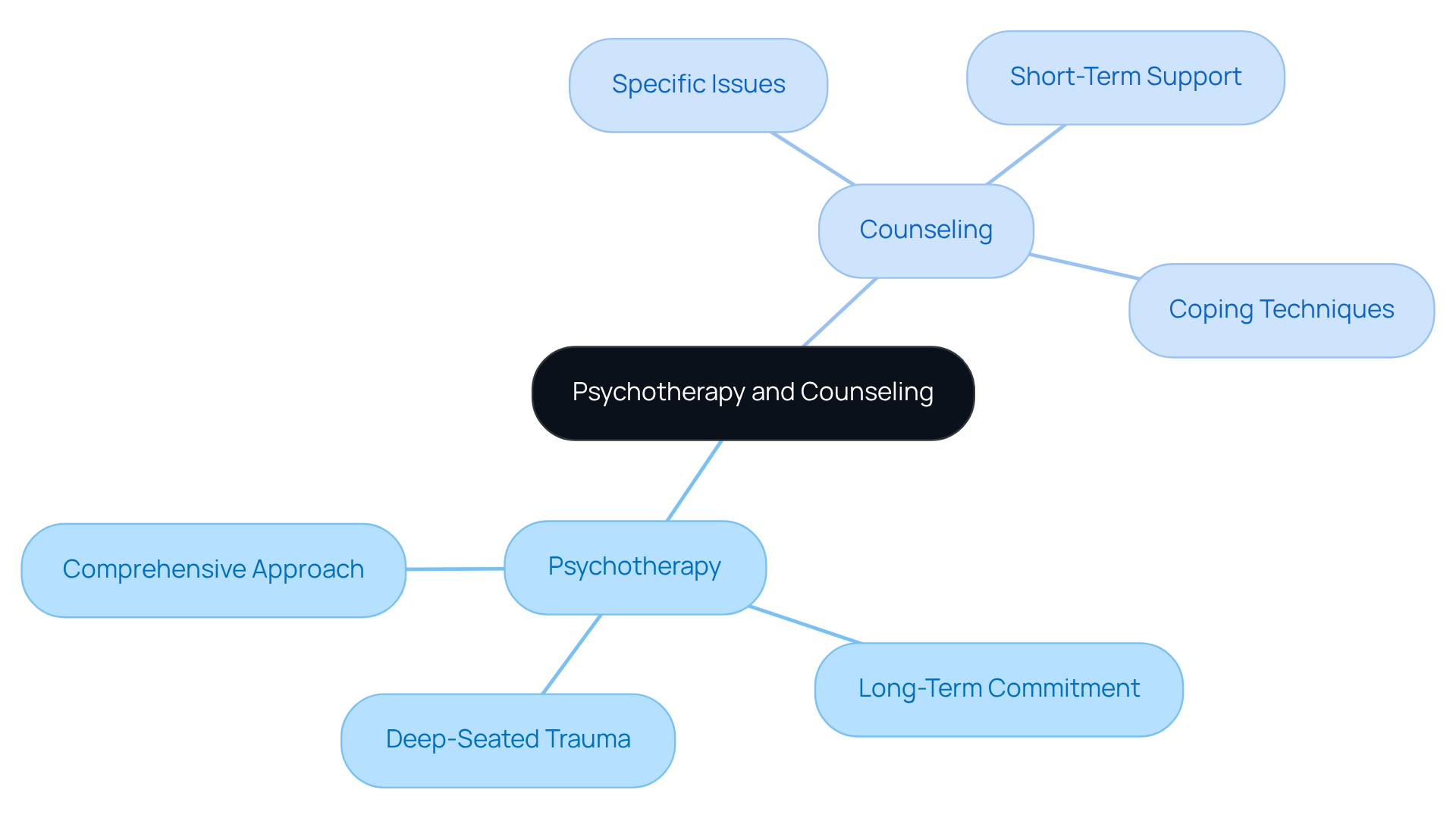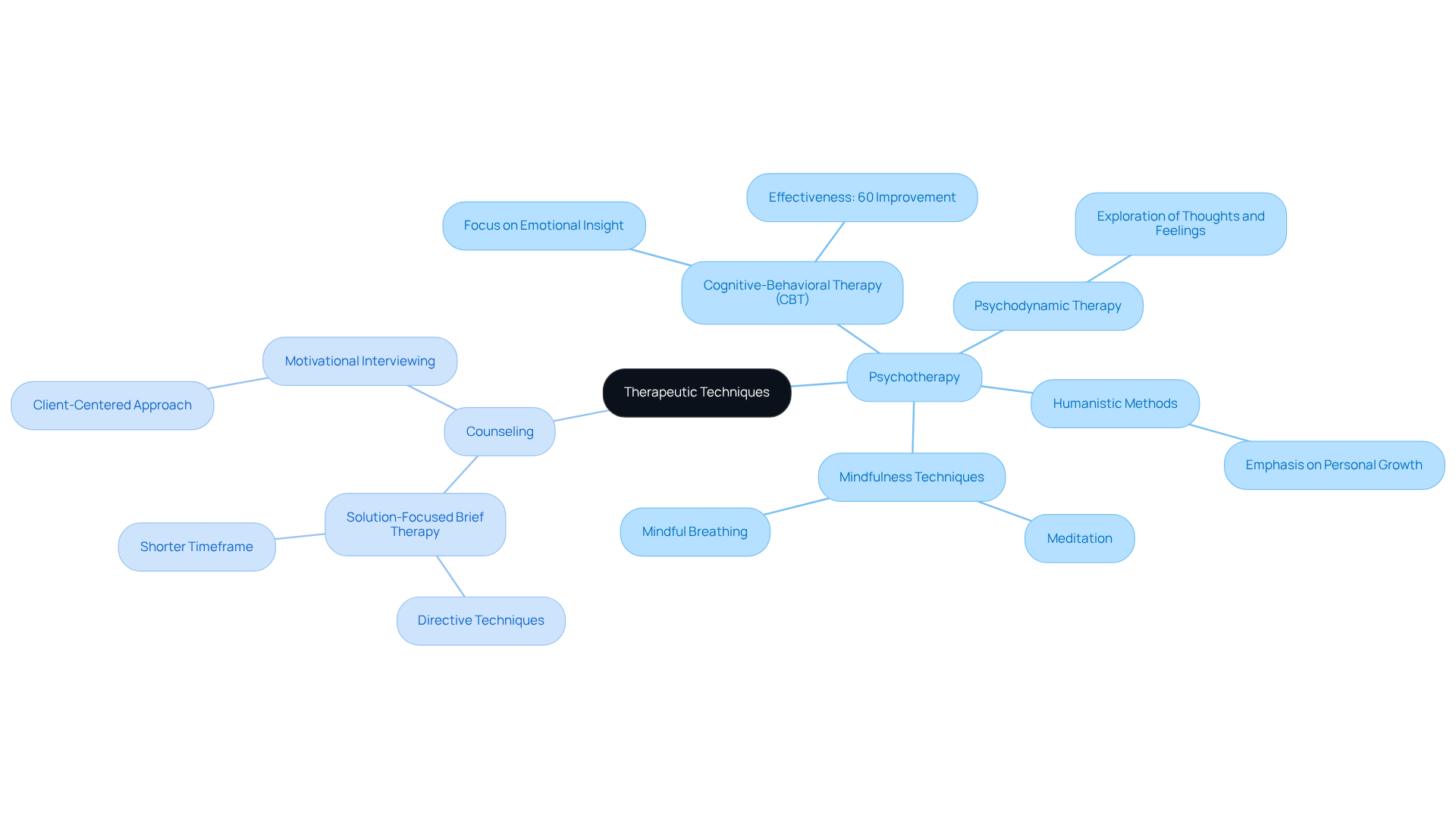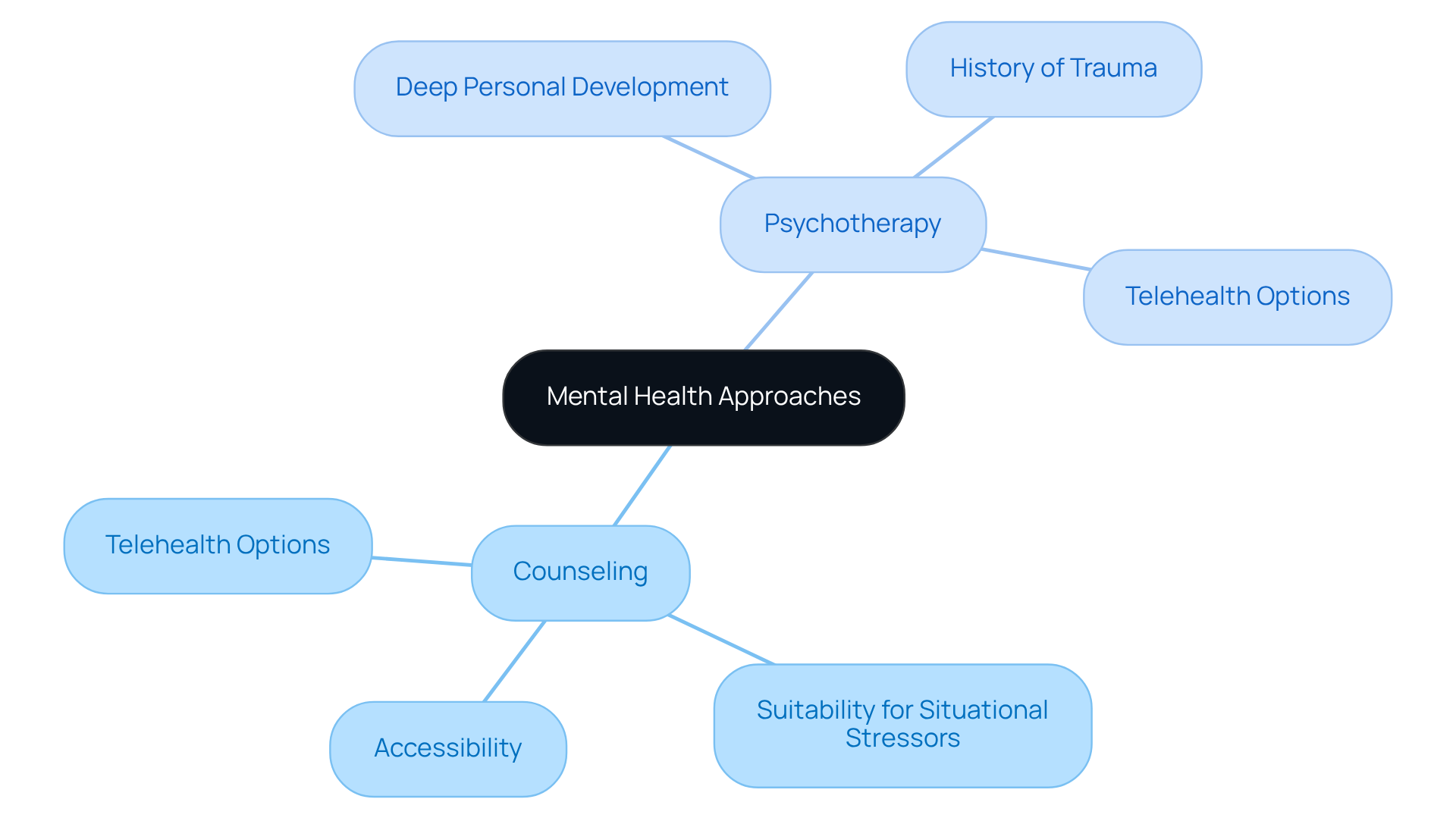Overview
This article explores the essential differences and effectiveness of psychotherapy and counseling, inviting you to consider your emotional well-being.
Psychotherapy is a more in-depth, long-term approach that aims to address deep-seated psychological issues, while counseling provides short-term support for specific challenges you may be facing.
Have you ever felt overwhelmed by your past? This distinction is crucial, as evidence suggests that psychotherapy often leads to more significant and lasting improvements in mental health for individuals grappling with complex emotional challenges.
On the other hand, counseling can be more accessible and suitable for those seeking immediate assistance.
As we delve deeper into these approaches, it's important to recognize the value each can bring to your healing journey.
Introduction
Understanding the nuances between psychotherapy and counseling is crucial for anyone seeking mental health support. Have you ever felt overwhelmed by your past? While both approaches aim to improve emotional well-being, they differ significantly in their methods and outcomes.
This article delves into the key distinctions between these two forms of treatment, exploring their unique techniques, effectiveness, and suitability for various mental health challenges. As we explore this further, the question remains: which path offers the most profound healing and lasting change?
As individuals navigate their personal journeys, it is essential to consider what resonates with them on a deeper level.
Define Psychotherapy and Counseling: Core Concepts and Differences
While psychotherapy vs counseling are often used interchangeably, they represent . Psychotherapy offers a comprehensive approach that delves into emotional and psychological issues, often addressing long-standing patterns and deep-seated trauma. This method typically requires a longer-term commitment, aiming for profound personal growth and healing. In contrast, guidance tends to focus on specific issues or situations, providing short-term support to help clients navigate immediate challenges. While guidance may address symptoms and offer coping techniques, therapeutic intervention seeks to explore the root causes of those symptoms, making it a more thorough process.
Understanding the differences between psychotherapy vs counseling is essential for individuals seeking help, as it influences the type of support they may need based on their unique circumstances. Have you ever felt overwhelmed by your past? Recent statistics indicate that around 75% of people who engage in therapy report experiencing benefits from it, highlighting the effectiveness of both talk therapy and guidance in enhancing psychological well-being. Furthermore, the distinction in treatment approaches between psychotherapy vs counseling can significantly impact treatment participation and effectiveness, as counseling often fosters deeper therapeutic connections that promote lasting transformation.
As mental health awareness continues to grow, understanding the differences between psychotherapy vs counseling becomes increasingly important for those navigating their mental health journeys. In addition to this, embracing the support available can lead to meaningful change and healing. Remember, seeking help is a courageous step towards a brighter future.

Examine Therapeutic Techniques: Approaches in Psychotherapy vs Counseling
The methods employed in mental health treatment and guidance highlight the significant differences in psychotherapy vs counseling that are important to understand. Psychotherapy often utilizes approaches such as cognitive-behavioral therapy (CBT), psychodynamic therapy, and humanistic methods. These techniques focus on exploring thoughts, feelings, and behaviors over time, aiming to cultivate deep emotional insight and facilitate lasting change. For instance, have you ever felt overwhelmed by anxiety or depression? Studies indicate that approximately 60% of clients experience significant improvement after undergoing CBT, highlighting its effectiveness in fostering healing.
In contrast, therapeutic guidance typically employs , such as solution-focused brief therapy and motivational interviewing. These methods are tailored to help clients address specific issues within a shorter timeframe. While both therapy and counseling incorporate elements of active listening and empathy, therapy often requires a broader skill set from the therapist, as it navigates complex emotional landscapes and facilitates profound personal transformations.
A crucial element of therapy at The Emerald Couch is the incorporation of mindfulness techniques, such as meditation and mindful breathing. These practices can enhance emotional regulation and personal development. Mindfulness encourages clients to build awareness of their thoughts and feelings, allowing them to slow down and make conscious choices in their therapeutic journey. This approach not only aids in managing anxiety and stress but also fosters a deeper understanding of oneself, which is particularly important for trauma survivors.
As psychological wellness practices continue to evolve, understanding the differences between psychotherapy vs counseling becomes vital for individuals seeking the most appropriate assistance for their needs. Remember, taking the first step towards healing is a courageous act, and support is available for you on this journey.

Compare Outcomes: Effectiveness of Psychotherapy and Counseling for Mental Health
Research consistently reveals that therapeutic interventions can be profoundly beneficial for individuals grappling with complex mental health challenges, especially those related to trauma and chronic anxiety. Have you ever felt overwhelmed by your past? You're not alone. Studies indicate that approximately 75% of people seeking therapeutic help notice some positive change, with many experiencing substantial and lasting improvements in their emotional well-being.
In contrast, therapy often proves to be more effective for those facing specific, situational challenges, such as stress management or relationship difficulties. While both psychotherapy vs counseling can yield favorable outcomes, the depth and duration of psychotherapy often result in more significant and enduring benefits for individuals with deep-seated psychological issues. For instance, have demonstrated strong efficacy in treating PTSD, with exposure-based treatments showing particularly robust effects in maintaining symptom reduction over time.
Ultimately, the decision between talk therapy and guidance should be guided by , the complexity of your challenges, and your desired outcomes. This ensures a tailored approach to your journey toward well-being. Remember, seeking help is a courageous step towards healing, and you deserve the support that resonates with your personal experience.
Accessibility and Client Suitability: Who Benefits from Each Approach
Accessibility plays a vital role in your decision-making process when considering psychotherapy vs counseling. Have you ever felt overwhelmed by your past? Counseling often presents itself as a more accessible option due to its shorter duration and focused approach on specific issues. This makes it ideal for individuals seeking immediate support or those with limited time. It’s particularly beneficial for clients facing situational stressors or navigating life transitions.
In contrast, psychotherapy may be more suitable for individuals with a history of trauma, complex emotional challenges, or those yearning for deeper personal development. Both practices can be delivered in-person or through telehealth options, allowing you to select the format that aligns best with your comfort levels and specific concerns. As we look ahead to 2025, the growing availability of teletherapy is enhancing access to psychological services, especially for underserved groups.
Understanding the distinct advantages of psychotherapy vs counseling empowers you to make informed choices about . This knowledge ensures you receive the support that best meets your needs, nurturing your journey towards healing and well-being.

Conclusion
Psychotherapy and counseling, though often confused, represent distinct avenues for mental health support, each catering to different needs and circumstances. Understanding these differences is essential for individuals seeking assistance, as it can significantly influence the type of therapeutic support they choose and ultimately their journey towards healing.
Have you ever felt overwhelmed by your past? The article highlights key distinctions between psychotherapy and counseling, including their core concepts, techniques, and effectiveness. Psychotherapy delves deeper into emotional and psychological issues, often requiring a longer-term commitment and employing various therapeutic methods. In contrast, counseling focuses on specific challenges, providing more immediate support and solutions. The effectiveness of both approaches is evident, with studies showing that a significant percentage of individuals report positive outcomes, underscoring the importance of choosing the right path based on personal needs and circumstances.
Ultimately, the choice between psychotherapy and counseling should be guided by individual experiences, the complexity of challenges faced, and desired outcomes. Embracing the support available, whether through psychotherapy or counseling, is a courageous step towards personal growth and emotional well-being. Understanding these differences not only empowers individuals to make informed decisions about their mental health care but also paves the way for meaningful change and healing in their lives.
Frequently Asked Questions
What is the main difference between psychotherapy and counseling?
Psychotherapy is a comprehensive approach that delves into emotional and psychological issues, often addressing long-standing patterns and deep-seated trauma, requiring a longer-term commitment. In contrast, counseling tends to focus on specific issues or situations, providing short-term support to help clients navigate immediate challenges.
What does psychotherapy aim to achieve?
Psychotherapy aims for profound personal growth and healing by exploring the root causes of emotional and psychological issues.
How does counseling differ in its approach to treatment?
Counseling focuses on addressing symptoms and providing coping techniques for specific issues, rather than exploring the deeper underlying causes of those symptoms.
Why is it important to understand the differences between psychotherapy and counseling?
Understanding these differences is essential for individuals seeking help, as it influences the type of support they may need based on their unique circumstances.
What percentage of people report experiencing benefits from therapy?
Around 75% of people who engage in therapy report experiencing benefits, highlighting the effectiveness of both psychotherapy and counseling in enhancing psychological well-being.
How can the distinction between psychotherapy and counseling impact treatment effectiveness?
The distinction can significantly impact treatment participation and effectiveness, as counseling often fosters deeper therapeutic connections that promote lasting transformation.
Why is mental health awareness important in the context of psychotherapy and counseling?
As mental health awareness continues to grow, understanding the differences between psychotherapy and counseling becomes increasingly important for individuals navigating their mental health journeys and seeking meaningful change and healing.




